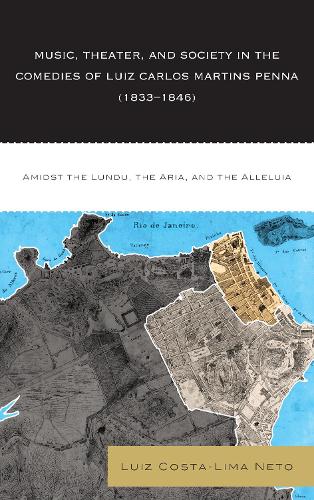
Music, Theater, and Society in the Comedies of Luiz Carlos Martins Penna (1833-1846): Amidst the Lundu, The Aria, and the Alleluia
(Hardback)
Publishing Details
Music, Theater, and Society in the Comedies of Luiz Carlos Martins Penna (1833-1846): Amidst the Lundu, The Aria, and the Alleluia
By (Author) Luiz Costa-lima Neto
Translated by Stephen Thomson Moore
Bloomsbury Publishing PLC
Lexington Books
15th March 2017
United States
Classifications
Tertiary Education
Non Fiction
Literary studies: plays and playwrights
Music of film and stage
Comedy and stand-up
869.23
Physical Properties
Hardback
344
Width 159mm, Height 239mm, Spine 26mm
717g
Description
This book clarifies the musical dramaturgy of comedy writer and musician Luiz Carlos Martins Penna (1815-48) a notion that encompasses both the theatrical text and its performance. The corpus for this analysis is composed of twelve comedies by Martins Penna written between 1833 and 1846, divided into three groups, which I have called Lundu, Aria, and Alleluia. The sound universe made up by the three groups of comedies covers African-Brazilian genres and musical-choreographic styles (batuque, fado, lundu, miudinho, muquiro), the transnational urban popular universe (lundu, tirana, quadrilha, marcha, waltz, caxuxa, tonadilla, polka), and modinhas and Italian opera, in addition to romantic concertos, Gregorian chant and Iberian religious theater (loas). To evaluate the multiple meanings acquired by the musical allusions inserted into the comedy texts and theatrical performances, this research reveals the network which included the author, actors, theater owners, publishers and the public, and other agents, such as black Catholic irmandades (brotherhoods), Freemasonry, and institutions linked to the imperial government. The sound universe of the comedies of Martins Penna are compared to the comedic axes of the Western theatrical tradition (a study of situations and characters) and the axes of performance (solo and chorus), contemplating the relationship between the repertoires written by Martins Penna and the repertoires of Brazilians and Portuguese artists, a mix of actors, singers and dancers, who performed in his comedies. The research questions the notion of authorship and reveals the importance of the partnership between theatrical writers, artists and publishers, through which the comedies of Martins Penna have reached the second half of the nineteenth century through the present.
Reviews
As the author reminds us, in terms of theatrical prestige, musical theatre is on the bottom rung, after opera and spoken drama. In research it is likewise. Thus any new contribution to this area is both rare and particularly valuable. Against a backdrop of the black slave trade in Imperial Rio de Janeiro, Luiz Costa-Lima Neto tells of the career and constraints of the dramatist, diplomat and musician Luiz Carlos Martins Penna (181548), the founder of the Brazilian comedy of manners. He describes in detail 12 of these comedies, focusing on the dramatic themes, music and other sounds centered on three areas: lundu (dance), aria (opera) and alleluia (religion), and in so doing makes a significant contribution to theatrical, musical and social history. -- David Cranmer, Universidade Nova de Lisboa
This is a meticulously researched and fascinatingly insightful study of the role played by music in the theatrical life of post-Independence Brazil. Thanks toLuiz de Franca Costa Lima Neto, we can now properly appreciate how, in the shadow of slavery, Martins Pennas musical comedies mischievously traversed the worlds of bourgeoisand popular culture in mid nineteenth-century Rio de Janeiro. -- David Treece, King's College London
The comedies by Martins Penna from 19th century Rio de Janeiro strongly witness to the perennial creativeness and subversive potential ofthe comic genius, even when we come to their stunning musical richness and variety. Luiz Costa-Lima Netos wide ranging study succeeds in bringing us deep into the social and culturalmilieuxof Martins Penna, the true cradle of the Brazilian popular culture and music, between Europe and Africa. -- Giorgio Monari, Universit di Roma Sapienza
Author Bio
Luiz Costa-Lima Neto is lecturer in music at the Martins Penna School of Theatre.
